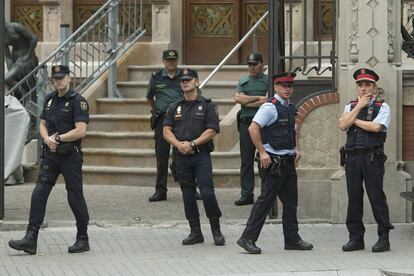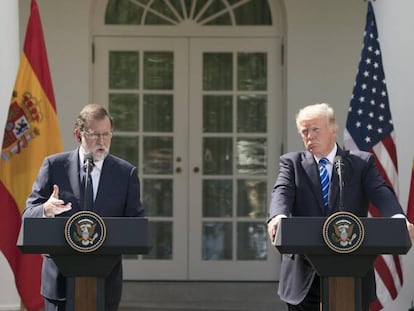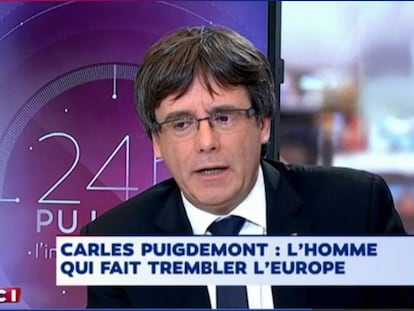The Spanish government must take the lead on Catalonia
The executive cannot continue to delegate its responsibilities over the October 1 referendum to the judiciary and prosecutors

It might be a strategy, or it might be incompetence, but whatever the case or the interpretation, the conduct of the Spanish government right now ¨C in the face of what is possibly the biggest crisis of state the country has seen since the attempted coup on February 23, 1981 ¨C is disconcerting, insufficient, borderline irresponsible and, of course, deserving of firm condemnation.
It is the central government, not the public prosecutor, that must explain what is happening in Catalonia
Dramatic events are taking place on a daily basis in Catalonia, and now also outside the northeastern Spanish region. The uncertainty as to what might happen is growing by the minute, and, with it, the anxiety of citizens. What is happening? How serious is it? What could be the possible outcome? It is the central government in Madrid that must respond to these questions, not the attorney general. It is the central government, not the public prosecutor, that must explain ¨C day after day ¨C what is happening, the measures that are being taken and which measures will be taken in the future.
It is unacceptable that every time ministers make a statement ¨C statements that are always made on the hoof, in the hallways of Congress, or arriving or leaving a public act ¨C they limit themselves to repeating the mantra that the justice system is responsible for taking the pertinent measures.
EL PA?S has stated on a number of occasions that the Popular Party government led by Prime Minister Mariano Rajoy cannot hide behind the justice system in the face of a crisis on this scale. At these levels of the conflict, it is unacceptable for Rajoy and his ministers to carry on without facing the music in front of the whole country.
The conduct of the Spanish government right now is deserving of firm condemnation
Everything that has been done so far to stop the illegal referendum planned for October 1 to take place has been within the judicial sphere, and in the hands of judges, prosecutors and the Civil Guard. The only direct implication of a member of the Cabinet has been on a technical basis ¨C from Finance Minister Crist¨®bal Montoro. A week has passed since the last public statement from Mariano Rajoy. Not even the government spokesperson is fulfilling his role.
Does the government really have nothing to say to its citizens, to those who live inside Catalonia, and those who live outside? Is it not necessary to explain the coercive measures that have been put in place by the justice system? Does the government not feel obliged to take responsibility for these measures? Is there not a project to defend, a plan to explain, a policy to implement?
The worst part is that suspicions now abound that, in effect, none of these things exist, and that total trust is being placed in the Civil Guard to be able to stop the referendum from happening, and that the problem will go away by itself afterwards. The government has no narrative of its own with which to counter the deceptive and false ¨C albeit clever and oft-repeated ¨C account of the pro-secessionists.
The government has no narrative of its own with which to counter the deceptive and false account of the pro-secessionists
There are four days to go until October 1. And it is very late for the central government to respond to the historic moment through which we are living. It is also late in the day to counteract the dreadful behavior of the pro-independence forces with the right policies. We are, however, in time for them to lead the way with the situation: for them to appear before the nation and offer the guarantees and expectations that are being demanded. By this stage, this will not avoid events from taking place on October 1, but it could still serve to try to create better conditions in which to take the political decisions that will no doubt be necessary immediately afterward.
English version by Simon Hunter.
Tu suscripci¨®n se est¨¢ usando en otro dispositivo
?Quieres a?adir otro usuario a tu suscripci¨®n?
Si contin¨²as leyendo en este dispositivo, no se podr¨¢ leer en el otro.
FlechaTu suscripci¨®n se est¨¢ usando en otro dispositivo y solo puedes acceder a EL PA?S desde un dispositivo a la vez.
Si quieres compartir tu cuenta, cambia tu suscripci¨®n a la modalidad Premium, as¨ª podr¨¢s a?adir otro usuario. Cada uno acceder¨¢ con su propia cuenta de email, lo que os permitir¨¢ personalizar vuestra experiencia en EL PA?S.
?Tienes una suscripci¨®n de empresa? Accede aqu¨ª para contratar m¨¢s cuentas.
En el caso de no saber qui¨¦n est¨¢ usando tu cuenta, te recomendamos cambiar tu contrase?a aqu¨ª.
Si decides continuar compartiendo tu cuenta, este mensaje se mostrar¨¢ en tu dispositivo y en el de la otra persona que est¨¢ usando tu cuenta de forma indefinida, afectando a tu experiencia de lectura. Puedes consultar aqu¨ª los t¨¦rminos y condiciones de la suscripci¨®n digital.










































